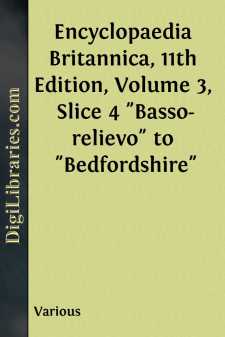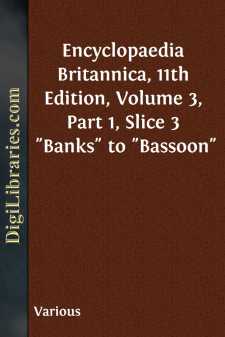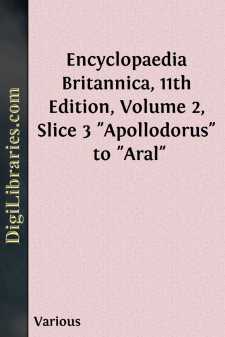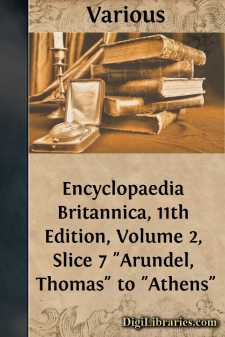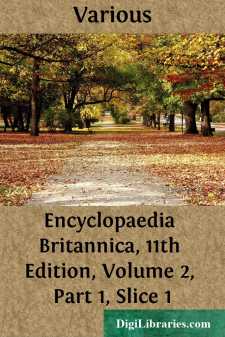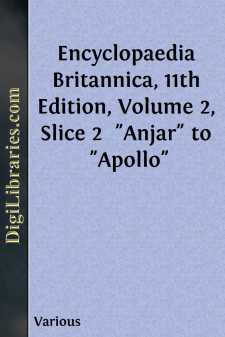Reference
- Atlases 1
- Bibliographies & Indexes 10
- Catalogs 55
- Dictionaries 1
- Encyclopedias
- Etiquette 14
- Handbooks & Manuals 19
- Heraldry 2
- Quotations 9
Encyclopedias Books
Sort by:
by:
Various
BRESCIA (anc. Brixia), a city and episcopal see of Lombardy, Italy, the capital of the province of Brescia, finely situated at the foot of the Alps, 52 m. E. of Milan and 40 m. W. of Verona by rail. Pop. (1901) town, 42,495; commune, 72,731. The plan of the city is rectangular, and the streets intersect at right angles, a peculiarity handed down from Roman times, though the area enclosed by the...
more...
by:
Various
BENT, JAMES THEODORE (1852-1897), English traveller, was the son of James Bent of Baildon House, near Leeds, Yorkshire, where he was born on the 30th of March 1852. He was educated at Repton school and Wadham College, Oxford, where he graduated in 1875. In 1877 he married Mabel, daughter of R.W. Hall-Dare of Newtownbarry, Co. Wexford, and she became his companion in all his travels. He went abroad...
more...
by:
Various
AUSTRIA, LOWER (Ger. Niederösterreich or Österreich unter der Enns, "Austria below the river Enns"), an archduchy and crownland of Austria, bounded E. by Hungary, N. by Bohemia and Moravia, W. by Bohemia and Upper Austria, and S. by Styria. It has an area of 7654 sq. m. and is divided into two parts by the Danube, which enters at its most westerly point, and leaves it at its eastern...
more...
by:
Various
BASSO-RELIEVO (Ital. for âlow reliefâ), the term applied to sculpture in which the design projects but slightly from the plane of the background. The relief may not project at all from the original surface of the material, as in the sunken reliefs of the Egyptians, and may be nearly flat, as in the Panathenaic procession of the Parthenon. In the early 19th century the term basso-relievo, or...
more...
by:
Various
BANKS, GEORGE LINNAEUS (1821-1881), British miscellaneous writer, was born at Birmingham on the 2nd of March 1821. After a brief experience in a variety of trades, he became at the age of seventeen a contributor to various newspapers, and subsequently a playwright, being the author of two plays, a couple of burlesques and several lyrics. Between 1848 and 1864 he edited in succession a variety of...
more...
by:
Various
BEDLAM, or Bethlehem Hospital, the first English lunatic asylum, originally founded by Simon FitzMary, sheriff of London, in 1247, as a priory for the sisters and brethren of the order of the Star of Bethlehem. It had as one of its special objects the housing and entertainment of the bishop and canons of St Mary of Bethlehem, the mother-church, on their visits to England. Its first site was in...
more...
by:
Various
APOLLODORUS, an Athenian painter, who flourished at the end of the 5th century B.C. He is said to have introduced great improvements in perspective and chiaroscuro. What these were it is impossible to say: perspective cannot have been in his day at an advanced stage. Among his works were an Odysseus, a priest in prayer, and an Ajax struck by lightning. APOLLODORUS, an Athenian grammarian, pupil of...
more...
by:
Various
ARUNDEL, THOMAS (1353-1414), archbishop of Canterbury, was the third son of Richard Fitzalan, earl of Arundel and Warenne, by his second wife, Eleanor, daughter of Henry Plantagenet, earl of Lancaster. His family was an old and influential one, and when Thomas entered the church his preferment was rapid. In 1373 he became archdeacon of Taunton, and in April 1374 was consecrated bishop of Ely. During...
more...
by:
Various
ANDROS, SIR EDMUND (1637-1714), English colonial governor in America, was born in London on the 6th of December 1637, son of Amice Andros, an adherent of Charles I., and the royal bailiff of the island of Guernsey. He served for a short time in the army of Prince Henry of Nassau, and in 1660-1662 was gentleman in ordinary to the queen of Bohemia (Elizabeth Stuart, daughter of James I. of England). He...
more...
by:
Various
ANJAR, a fortified town of India, and the capital of a district of the same name in the native state of Cutch, in the presidency of Bombay. The country is dry and sandy, and entirely depends on well irrigation for its water supply. The town is situated nearly 10 miles from the Gulf of Cutch. It suffered severely from an earthquake in 1819, which destroyed a large number of houses, and occasioned the...
more...





